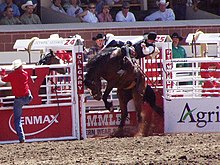 Bucking horse at the Calgary Stampede in 2002 | |
| Highest governing body | Professional Rodeo Cowboys Association |
|---|---|
| First played | 1869 |
| Characteristics | |
| Team members | No |
| Mixed-sex | Yes |
| Type | Indoor or Outdoor |
Rodeo (/ˈroʊdioʊ, rəˈdeɪoʊ/) is a competitive equestrian sport that arose out of the working practices of cattle herding in Spain and Mexico, expanding throughout the Americas and to other nations. It was originally based on the skills required of the working vaqueros and later, cowboys, in what today is the western United States, western Canada, and northern Mexico. Today, it is a sporting event that involves horses and other livestock, designed to test the skill and speed of the cowboys and cowgirls. American-style professional rodeos generally comprise the following events: tie-down roping, team roping, steer wrestling, saddle bronc riding, bareback bronc riding, bull riding and barrel racing. The events are divided into two basic categories: the rough stock events and the timed events. Depending on sanctioning organization and region, other events such as breakaway roping, goat tying, and pole bending may also be a part of some rodeos. The "world's first public cowboy contest" was held on July 4, 1883, in Pecos, Texas, between cattle driver Trav Windham and roper Morg Livingston.[1]
American rodeo, particularly popular today throughout the western United States, and in the Canadian province of Alberta, is the official state sport of Wyoming, South Dakota, and Texas. The iconic silhouette image of a "Bucking Horse and Rider" is a federal and state-registered trademark of the State of Wyoming.[2] The Legislative Assembly of Alberta has considered making American rodeo the official sport of that province. However, enabling legislation has yet to be passed.
In the United States, professional rodeos are governed and sanctioned by the Professional Rodeo Cowboys Association (PRCA) and Women's Professional Rodeo Association (WPRA), while other associations govern assorted children's, high school, collegiate, and other amateur or semi-professional rodeos. Associations also exist for Native Americans and other minority groups. The traditional season for competitive rodeo runs from spring through fall, while the modern professional rodeo circuit runs longer, and concludes with the PRCA National Finals Rodeo (NFR) in Las Vegas, Nevada, currently held every December.[3]
Rodeo has provoked opposition from animal rights and some animal welfare advocates, who argue that various competitions constitute animal cruelty. The American rodeo industry has made progress in improving the welfare of rodeo animals, with specific requirements for veterinary care and other regulations that protect rodeo animals. However, some local and state governments in North America have banned or restricted rodeos, certain rodeo events, or types of equipment. Internationally, rodeo is banned in the United Kingdom and the Netherlands,[4] with other European nations placing restrictions on certain practices.
- ^ The Book of Extraordinary Facts. Lincolnwood, Illinois: Publications International, Ltd. 2012. pp. 56–57. ISBN 978-1-4508-5395-8.
- ^ General Wyoming Information, web site accessed July 12, 2007 at http://www.netstate.com/states/symb/wy_symb.htm Archived 2019-10-28 at the Wayback Machine
- ^ "National Finals Rodeo (NFR)". WatchNFR. Archived from the original on March 20, 2022. Retrieved November 10, 2020.
- ^ Rodeo: animal abuse for the sake of entertainment Archived 2017-07-22 at the Wayback Machine, Vancouver Humane Society, accessed April 2, 2009.